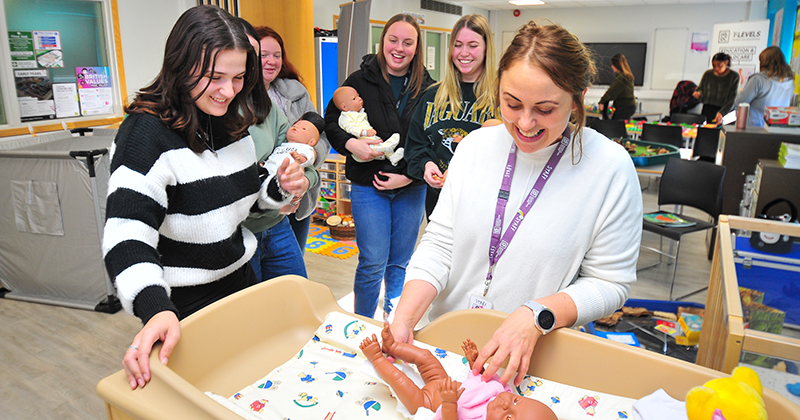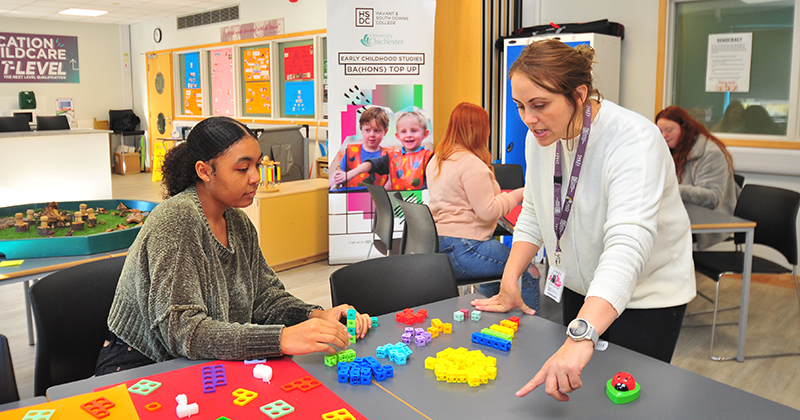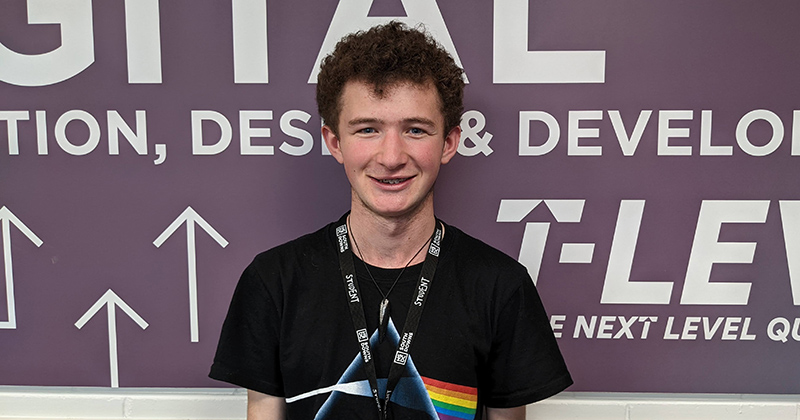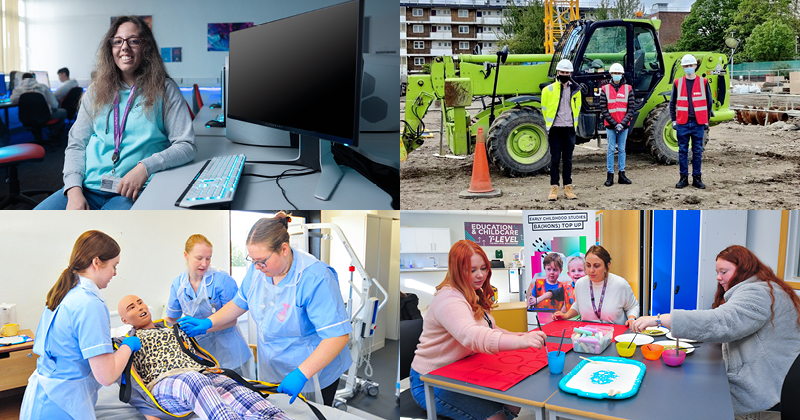Teething problems and tweaks notwithstanding, FE providers are unexpectedly positive about the biggest new technical and vocational qualifications in generations. How can DfE get them right in the long term? Jess Staufenberg finds out
“What’s been really good about the T Level is it’s not just learning from a textbook. It’s been about learning through skills and knowledge. It really has helped us to be more confident.”
Pushra Mohamed, an education and childcare T Level student at Newham Sixth Form College in east London, is explaining her experience as part of the first student cohort in the country to complete their two-year T Level.
According to the government, 1,300 students enrolled on the first three T Levels, which were rolled out in September 2020: design, surveying and planning for construction; digital production, design and development; and education and childcare.
“It was the work placement that attracted me to the T Level,” continues Mohamed, smiling. “Personally, I found it pretty hard at the beginning, but I learnt that as much as you put yourself out there, you get the support you need.”
It now means that she and other T Level students are setting out into the world for the first time this summer.
So, after all the fanfare and criticism, are they working for students?
First off, it’s unusual for any news report to begin with an overwhelming positive answer to this kind of question. But it accurately reflects the overwhelmingly positive response from the sector when we asked the list of FE providers whose students finished T Levels this year for their feedback.
In fact, it’s the considerable excitement from staff and students at the end of the two years that probably makes tweaks to the programme all the more important. People are clearly deeply invested.
It means a recurring question around T Levels may become even more urgent, rather than less: can and should they become the mainstream technical qualification? And if so, when?
Teething problems
First off, FE providers who chose to run a T Level over the past two years have made it clear that setting up the new programmes was hard work.
Andrew Stubbs, construction T Level lead at Walsall College in the West Midlands, said providers thinking of running T Levels in future must “go into it with your eyes open. You need to be prepared for a lot of hard work, especially setting up the project-based learning”.
The biggest piece of work was setting up the T Level’s industry placement with employers, to meet the 315-hour placement requirement for the construction and digital T Levels – and the absolutely enormous 750-hour industry requirement for the education and childcare T Level, say providers.
Chrystel St Ledger, T Level lead at Newham Sixth Form College, echoes wide sector feedback to FE Week when she says her staff were “literally banging on doors” to get employers involved.
“We were saying, ‘this is what T Levels are, we need your support, this is your corporate social responsibility’. It’s too much for one or two members of staff,” she shakes her head.

This issue is raised again and again by providers. As Sunny Bamra, director of construction at Suffolk New College, puts it: “Let’s be honest: the [now former] education secretary Nadhim Zahawi might have a T Level badge on his suit but no one really knows what it is.”
Another issue has been that many digital industry placements involve remote working teams but the T Level guidance requires students to be supervised in-person, providers tell me.
Diana Martin, vice principal at Dudley College of Technology, says the government needs to re-think the traditional “9 to 5 in the office” model of digital T Level placements, as this does not reflect many modern workplaces post-Covid.
The government also currently limits industry placement to “up to two employers”, but extending this cap to three or four would help with finding those placements, Martin adds.
Other teething problems include making sure “apprehensive” parents got enough information and reassurance, continues Martin Lake, a tutor on the construction T Level at Walsall College. He also recommends staff being well-prepared with emergency contact numbers and clear safeguarding processes, given how long students spend off-site with employers.
Likewise, staff had to give students “a lot of additional support around transport methods” to placements, explains Lake. Getting a clear expenses system set up will also ensure both accessibility to placements but also prevent unnecessarily high spend on taxis, he adds.
The workload on staff was also not helped by an initial lack of resources available for some T Levels, explains one college lecturer, who did not wish to be named.
“One of the course textbooks was late coming out from our awarding organisation,” they tell me. “There’s definitely a need for more specialist expert curriculum support from them, too. We were invited to an event on the education and childcare T Level a few weeks ago, but that would have been really useful earlier.”
This view is corroborated by Kev Heys, digital T Level lead at Walsall College, who adds: “At the start, there were no real resources available. It’s better now.”
Unexpected staff benefits
But all the hard work and sweat has also presented staff with invigorating opportunities, say numerous providers.
Ashley Grute, assistant principal and T Level lead at Havant and South Downs College in Hampshire, says “there’s been so much opportunity for staff CPD, it’s been such a positive experience. They’re going properly back into industry to upskill and find out what the latest trends are.”
For instance, Nicolette Dryden, digital T Level lead at the college, upskilled around coding language Python – in particular, for facial-recognition technology – to be able to support student project work. Her colleague Will Sparrow, construction T Level lead, spent time with the University of Portsmouth and companies in the public and private sectors to talk with them about T Level programme content.

The need to upskill plus the search for industry placements means staff-employer relationships have also strengthened, adds Grute. “We’ve set up an employer partner board for each T Level, to understand skills gaps and ask for those opportunities around upskilling.”
The feeling seems to be that staff have been boosted by a sense of inward investment into FE and themselves as professionals, he adds.
“For staff, they feel the qualifications have been really invested in, and that they are teaching world-class qualifications with industry-standard equipment,” says Grute.
This has been underpinned by significant sums of money: Havant and South Downs College won half a million pounds from the T Level capital fund for estate refurbishment, including £500,000 for new construction, early years and digital facilities; £750,000 for a new hospital ward, community nursing facility and science laboratories and about £2 million for electronics labs and computer-aided design rooms.
Perhaps most importantly of all, numerous staff have told FE Week with apparently genuine enthusiasm how much they have enjoyed teaching the T Level compared to BTECs.
“It’s given staff their freedom back,” says Bernadette Turner, head of learning for apprenticeships at Dudley College of Technology. “With the diploma, it becomes very target- and deadline-driven. The students have to complete a set amount of tasks on a set amount of units within a set amount of time.”
By contrast, the T Level is built up over two years, allowing staff to spend longer on an area if needed, and also encouraging more creativity among students, she says.
Her words are echoed by Naz Hamilton, education and childcare lead at Newham Sixth Form College. “It gives us more autonomy about how to assess students. With the BTEC, you have to follow the unit, but this has encouraged a greater amount of working with other teachers.”
Programme design tweaks
The area that FE providers have struggled most with – industry placements – has also been the area they have praised the most.
Victoria Moyse is work experience and placement lead at Education Partnership North East, which includes Sunderland College, Northumberland College and Hartlepool Sixth Form.
She puts it this way: “We’ve always offered work experience at level 3 and level 2, but it’s been very much part of enrichment, really. It would be more like shadowing, light-touch work experience.” A BTEC student does about four weeks of work experience, she says.
By contrast, students on T Level placements are “like trainee employees,” says St Ledger at Newham Sixth Form College. As a result, many providers run proper interviews and selection processes alongside employers to ensure the placements are a success.
“We went through a proper matching service and every student had three interviews,” adds Moyse. “But it meant when placements started, the students and employers really benefited.”

Paul Phillips, principal at Weston College, echoes this. “They’re not given a bit of insight into the company, they’re given a direct role. One of our students was given the role of junior developer and created a website for the company. It’s real value to the learner in terms of industry exposure.”
Until more placements are found, however, not all students who applied for T Levels have been accepted.
For instance, Walsall College got 70 applications for 20 construction T Level places, which were whittled down through interview. It raises the question: do ministers want the T Level to be so selective?
Students are similarly largely very positive about their placements – but are clear it can also be a mixed bag.
Joe Harper, who completed his digital T Level this year, has been told by national gas supplier SGN that he can approach them for work following a successful 17-day placement with them. “It was challenging, but that’s what it’s supposed to be. I’m really glad I did it.”
But another placement had “little relevance” to his course, following a mix-up, he says.
Meanwhile, on the assessment side, students (including Harper) and staff have mainly raised queries about the employer-set project, which is one of the assessed components. “The employer-set project wasn’t employer set, it’s set by the awarding organisation,” says Harper. “I think they should rename that or replace that with a genuinely employer-set project where you work properly with the employer on it.”

He is echoed by Stubbs, Heys and Lake, T Level leads at Wallsall College, who all say that the employer-set project “duplicates” the occupational specialism pathway on the T Level. The T Level is already huge, and doesn’t need to be made any bigger than necessary, they explain.
But no staff FE Week spoke to thinks the qualification should be reduced to the size of one A level. Their strength is the industry placement and project work, which would be too demanding to complete alongside other programmes, I’m told. As Phillips at Weston College tells me: “If they were smaller, I’m worried they’d basically be an A level with just a bit of work experience.”
What next?
The main thing holding providers back around T Levels is clearly the lack of awareness among employers, parents and schools about the qualification.
For baby qualifications, this is perhaps to be expected. But David Gallagher, chief executive at T Level awarding body NCFE, urges the DfE to run a “huge awareness campaign” among employers as soon as possible.
The employer-set project may also need a serious rethink, according to some providers.
But the real question is around expansion of T Levels over the coming years. Should they be selective, to ensure the ‘right’ students are on them? Or should they be more modular and iterative, to boost inclusion, including for adult learners?
If the latter, the debate over BTECs is far from done. Some staff still tell me “T Levels are not the answer to all the needs of the sector” while others say the BTECs feel “tired and old” and “out-of-date now”.
Interestingly, three providers tell me their employers are more impressed with, and would “prefer”, T Level students over BTEC students on placement. So – how will the DfE prevent a two-tier vocational qualifications system?
For now, students seem genuinely chuffed.
Abigail Tighe, who did the assisted teaching pathway in the education and childcare T Level at Dudley College, concludes: “I didn’t expect how much I would grow as a person.
“It was real responsibility, not just standing around. I’ve really gained a lot of skills.”

















Your thoughts